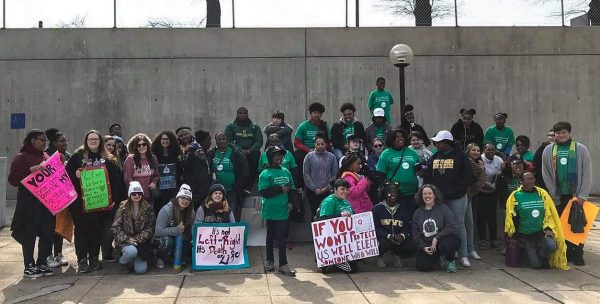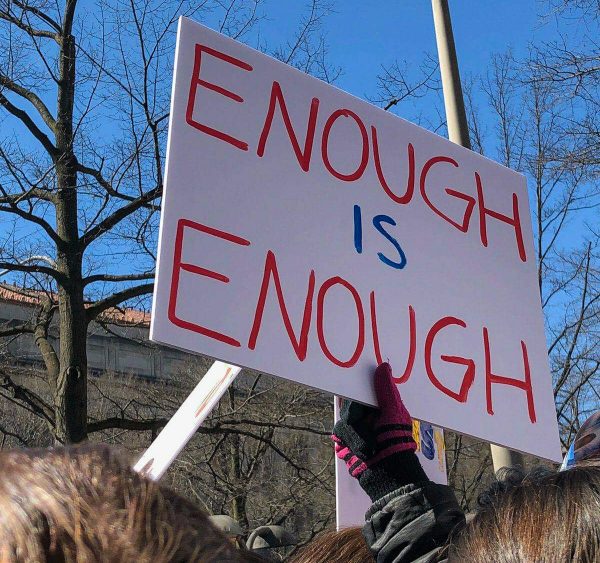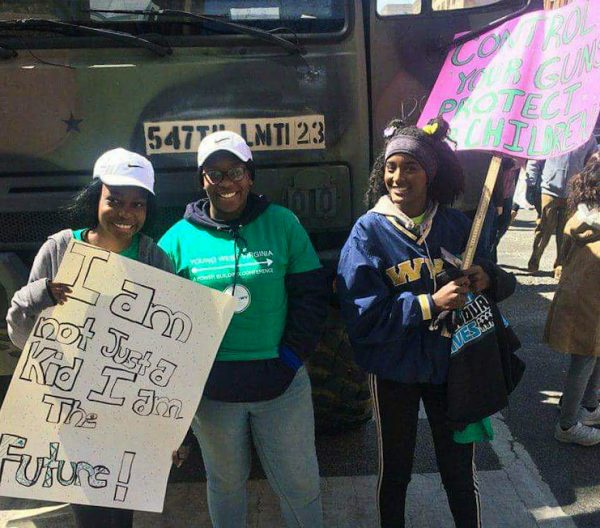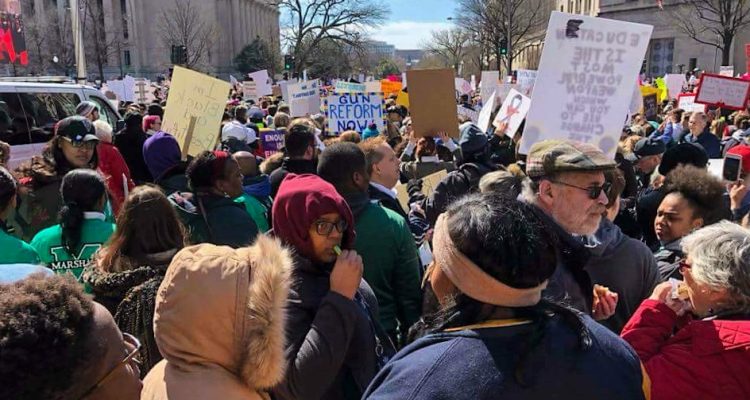They didn’t mind the hours of travel or the protesters who were protesting against them. They had something to do, and that was the March for Our Lives event in Washington, D.C., this past Saturday.
Two of the 55 West Virginia students were 15-year-old Amari Poole and 16-year-old Eldana Smith, both students at Wheeling Park High School who did participate in the 17-minute walkout on March 14 to pay respects to the 17 people gunned down in Florida on Feb. 14. The March for Our Lives event attracted as many as 800,000 people who trekked Pennsylvania Avenue before collecting for a rally between the White House and the U.S. Capitol.
Similar protests also took place in Pittsburgh, Boston, New York City, Los Angeles, Houston, Parkland, Fla., and in Wheeling at Heritage Port. Poole was a member of the state leadership committee that organized the state’s presence, and Eldana was accompanied by her 12-year-old sister, Abigia.
“I started communicating with Jennifer Wells with Our Children, Our Future after we had some (racial) issues at the high school, and then we formed a network with other students from several areas of West Virginia,” explained Poole. “When this issue became important to school students everywhere, we started talking about doing something so we could be part of it all.
“At first, traveling to Washington, D.C., to march was what we said we wanted to do, but I think at first it was just a crazy idea that probably wouldn’t happen, but that’s when we all sat down and decided that we could make it happen,” she said. “We started raising the funds for the trip, and we used social media a lot so we could get the word out. When we saw the reaction from others, that’s when we really started to believe we could make it happen. And it was a very memorable experience.”
The Ohio County contingent was not interviewed by the national news, and the event was not even acknowledged by many conservative media outlets on both national and local levels, but Smith knew to expect mixed reactions after speaking with friends before the trip.

“Because I like to hear the thoughts and views of others when I am getting involved with something, I talked to a lot of people knowing that a lot of them would be pro-gun because hunting is very popular in this area,” Smith said. “At first, it was more of a debate rather than just talking about it, but I think a lot of people understand more about it now that the march has taken place. Since we got home, the reactions have been much more positive than they have been negative.
“At school (Monday), I mentioned the trip to a teacher, and he asked me if I wanted to tell him about it, so I did,” she explained. “My teacher was glad that I participated because he believes that young people need to get more involved. I also had a couple of classmates who told me that they wished they had gone, but that they supported the reasons why we attended the march.”
Critics of March for Our Lives have alleged the children did not organize the event but instead were used as pawns by adults active against gun violence and firearm accessibility. It is an issue that has proved to be another social divider.
“Adults did not do this although there were adults involved with the trip,” Poole reported. “The children sat down for conference calls once or twice each week to determine what we needed to do. Now, there were adults who were speaking with adults because maybe, they didn’t want to hear it from a kid, but it was really the students that pulled all of the details together.
“We realize why some people are saying that this was really an adult rally. We know it’s because some people don’t believe children are capable of much,” she said. “But we were capable of this.”
Smith was born and partially raised in Ethiopia before she moved to the Upper Ohio Valley several years ago, and as an American citizen, she’s well aware she is less than two years away from having the right to vote in local, state and national elections. Never mind the issue, Smith has learned from her experience.

“I think it’s funny how adults don’t believe we can do anything like informing ourselves about what we are concerned about, but we do know the difference between right and wrong,” Smith said. “When we vote in the future, we’ll likely help vote some people out of office.
“I learned something because I took part in something bigger than myself that affects everyone in some way, and I found it interesting to be around people who are thinking the same way as you. People of all races, ages and genders, all of us were there to support one cause and each other,” she said. “There are children who go to school or walk down the street in Chicago, and they have been normalized by gun violence because it’s a daily occurrence there. Every day people die in Chicago because of gun violence.”
The demand presented government officials on Saturday included a ban on high-capacity magazines and a ban on assault-type rifles, tighter background checks, more school security and increasing the eligible age for purchasing a firearm. While President Donald Trump and congressional members have hinted at limited reform since the shooting in Parkland, no formal action has been initiated.
Neither teenager believes legislation will be crafted anytime soon, and they are well aware the majority of their classmates feel differently because only a few more than 100 students of the 1,500 attending classes at the school participated in the March 14 walkout.

“I was disappointed with the number of students who walked out, and that’s because I believe that this is something that should unify the community in an effort to do something about it. I was disappointed, yes, but I wasn’t surprised,” Smith said. “I don’t want to think it’s possible that a school shooting could happen here, but we just don’t know. That’s why we are trying to prevent it, and I see it more as a mental health issue than a school security issue.
“Way too often when these shootings have taken place, then the gun law conversation takes place, but then, eventually, we all move on past it,” she said. “But I don’t believe we can just say, ‘thoughts and prayers,’ and then move on. I believe you have to do something about it.”
“I feel safe at school,” Poole said. “But I know there will always be that one person who looks normal and acts normal, but on the inside, they could be going through so much without anyone to talk to. What concerns me is that, one day, that person will be that person. The person who shoots up the school.
“(The disrespect) makes me angry, but I am not going to show it because I know I can’t step up as a kid and still make change,” she added. “I am part of the future, and you can bet I will be voting in a couple of years. That’s why what other people say doesn’t really matter to me because I know, at the end of the day, that I can make a difference myself.”
(Photos provided by Jenny Smith)
• Steve Novotney has been a professional journalist for 23 years, working for weekly and daily newspapers, the official publication of the Pittsburgh Pirates, and talk radio stations in Pittsburgh and Wheeling. He took his journalism to the Ohio Valley airwaves in 2004, and he is a premier interviewer and feature writer. Steve has been married to his wife, Michelle, for more than 20 years, and they have two children, Michael and Amanda.





